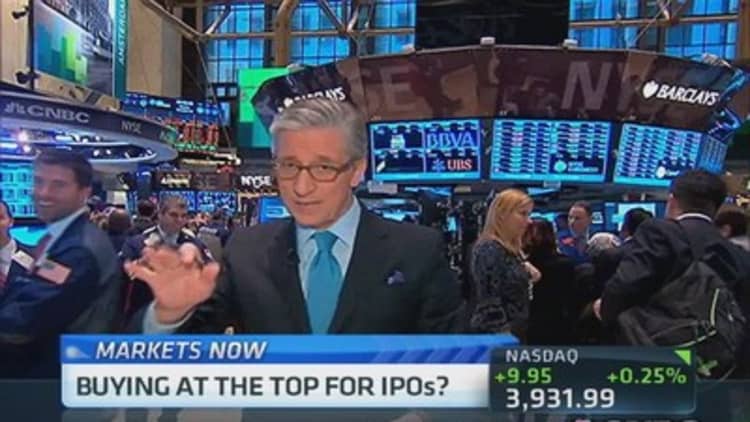The long freeze in initial public offerings (IPO) in China's stock markets may spur a wave of asset sales by private equity funds left with limited options for exiting their investments.
"My guess is that next year we'll start to see a massive wave of selling by renminbi funds because the IPO market in China has shut down for a year and people were expecting it would reopen at the end of this year. I don't think it's going to happen," Frank Tang, CEO at Fountainvest Partners, said at the AVCJ Asian Private Equity and Venture Forum in Hong Kong earlier this week.
(Read more: China badly needs IPO thaw)
Even if IPOs resume next year, "there'll be an existing 600 companies that have filed for an IPO and have been waiting for the last two years and there'll be another 800 that will file again. There will be a long pipeline. Even if China takes two companies' IPOs a day, it'll probably take three years to clear that pipeline up," Tang said.
While the renminbi funds created a lot of new investments over the past few years, those funds are nearing the end of their terms and limited partners will want to cash out, Tang said.

Regulators haven't allowed any A-share IPOs for around a year amid concerns over liquidity in the mainland's markets and it isn't clear when new issues will resume.
Once the full results of China's just-completed Third Plenum are released, the market may have some direction on when regulators will allow companies to offer shares again, said Edward Au, co-leader of Deloitte China's national public offering group. He noted the market has been waiting for new IPO regulations to be issued since a public consultation ended in June.
(Read more: One-third of global firms planning acquisitions: EY)
If the rules are issued close to the end of the year, any company hoping for an IPO will need to update its prospectus not only to match the new regulations, but also with their year-end financial results, he said.
Au expects the first batch of IPOs will be on ChiNext, the small-to-medium enterprise board in Shenzhen, as regulators will remain concerned that a large listing will hurt market liquidity.
In China, "up until now, IPO has been the predominate form of exit for good reason" as most private equity holdings were minority stakes, Fred Hu, chairman at Primavera Capital Group, said at the AVCJ forum. "How could you engineer trade sales when you are not in a majority position?"
Even if funds can find companies to buy their stakes, "we're still going to need, and actually pray, for a strong IPO market to make a trade sale happen on good terms," Hu said.
"A trade sale doesn't happen in a vacuum. It often goes hand-in-hand with a robust public market. Otherwise you'll be concerned what kind of price you'll fetch," Hu said. "Typically, M&A volume is positively correlated with IPO strength because CEOs are more confident in a positive IPO environment. When your stock price is strong you're more willing to do deals."
(Read more: Is the cloud over US-listed China stocks lifting?)
Private equity funds with a majority holding in a company may have an easier time. A trend of exiting investments by merging companies into big listed players is emerging, Zhen Gao, managing partner at Mandarin Capital Partners, said at the AVCJ forum.
"Oftentimes, the listed companies in China are full of cash and they also have the motivation to do acquisitions. For a lot of private equity firms, this (will be) quite (the) dominant way in the next few years," she said.
—By CNBC.Com's Leslie Shaffer; Follow her on Twitter @LeslieShaffer1

